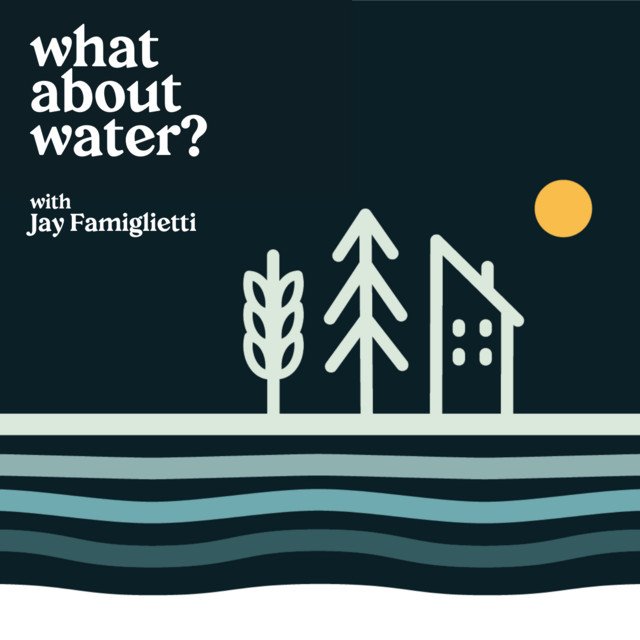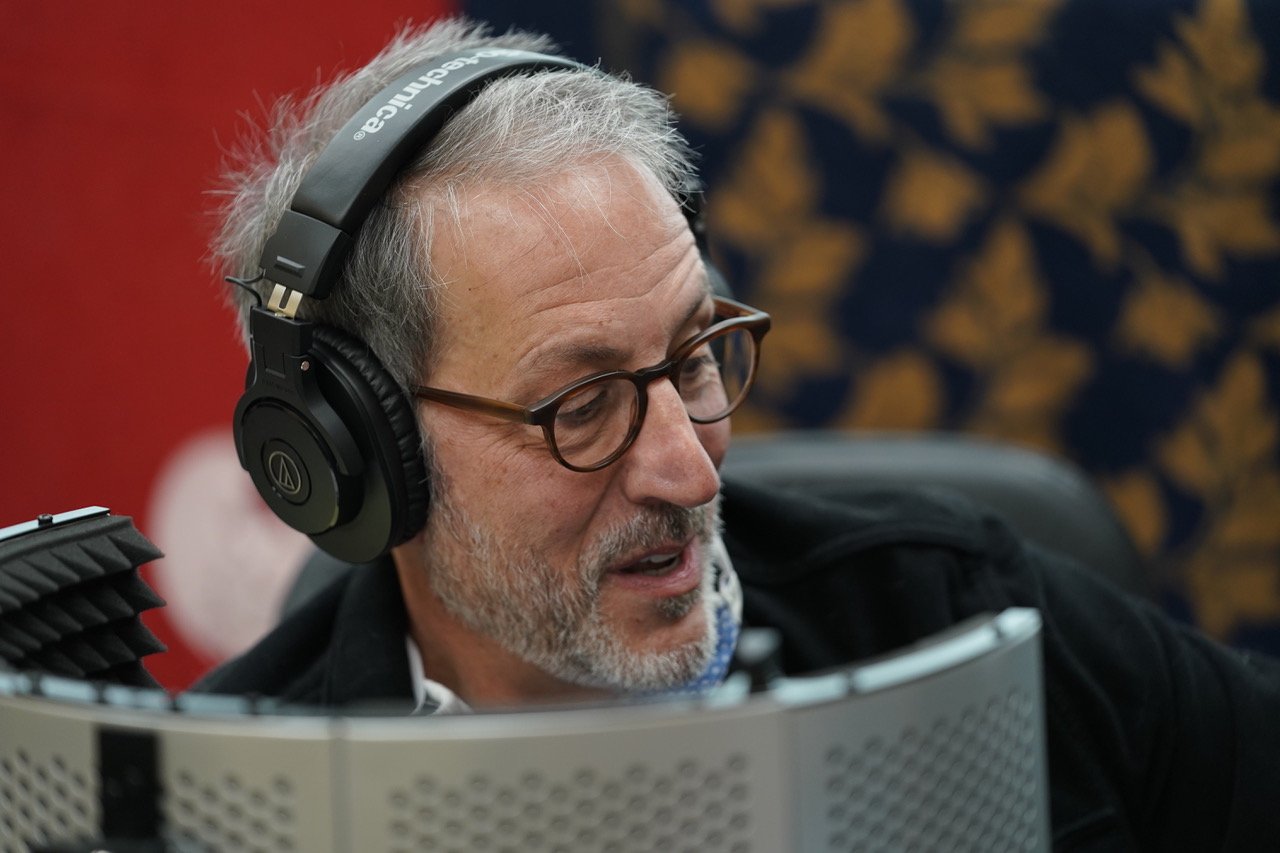Jay Famiglietti is a hydrologist, a professor and the Executive Director of the Global Institute for Water Security at the University of Saskatchewan, where he holds the Canada 150 Research Chair in Hydrology and Remote Sensing. He is also the Chief Scientist of the Silicon Valley tech startup, Waterplan. Before moving to Saskatchewan, he served as the Senior Water Scientist at the NASA Jet Propulsion Laboratory at the California Institute of Technology. From 2013 through 2018, he was appointed by Governor Jerry Brown to the California State Water Boards. He has appeared on CBS News 60 Minutes, on HBO’s Real Time with Bill Maher, as a featured expert in water documentaries including Day Zero and Last Call at the Oasis, and across a host of international news media. He is the host of the podcast What About Water?
JAY FAMIGLIETTI
I think water is taking a backseat and personally, I feel like water is the messenger that delivers the bad news of climate change to your front door. So in the work that I do, it's heavily intertwined, but it's taking a backseat. There are parts about water that are maybe separate from climate change, and that could be the quality discussions, the infrastructure discussions, although they are somewhat loosely related to climate change and they are impacted by climate change. That's sometimes part of the reason why it gets split off because it's thought of as maybe an infrastructure problem, but you know, the changing extremes, the aridification of the West, the increasing frequency, the increasing droughts, these broad global patterns that I've been talking about, that I've been looking at with my research – that's all climate change. Just 100% climate change, a hundred percent human-driven. And so it does need to be elevated in these climate change discussions.
*
The research that I've done with these NASA satellites - they’re called the Grace Mission, Gravity Recovery and Climate Experiment Mission, and they're really unusual in that they're able to weigh, using small variations in the pull of gravity that water exerts on the satellites. Satellites are like a scale. They move up and down in the sky depending on how much water there is on the ground. So we can map out these places that are gaining or losing water on a monthly basis. And you know, now the satellites have been flying for 20 years, so we can see these trends.
And so when you see those pictures, and you start going to conferences, and you start going to Washington D.C., to Ottawa, and to international meetings, you realize there are not a lot of places to go and talk about this. The way we deal with water within states, within the country, within the United States, and even within Canada – a lot of the world is really fractured. So when you go and you try to talk about these global issues, it's really, really hard. And so again, I use the term under-institutionalized. Who is actually going to stand up?
UCI/NASA GRACE Animations:
Check out the recently-updated animations for India, the Middle East, and for California’s Central Valley
Trends in total water storage from the NASA GRACE and GRACE Follow-On Missions from 2002-2022. Red areas have lost water over the last 20 years, while blue areas have gained water. Image: Map updated from Rodell, Famiglietti, et al. 2018 by Chandanpurkar et al, 2022
FAMIGLIETTI
So one of the things that we find about water is that it's really under-institutionalized. I mean the UN plays a big role, and there's actually a big UN Groundwater meeting coming up in Paris at the end of the year, and sometimes these agencies don't really have the teeth to get things done. And I think that although a lot of the work that I do is related directly to climate, I think water sort of takes a backseat to broader climate change issues and carbon issues. So I think that, in general, there's a great willingness to work together across countries, internationally on water management, and on securing our global water futures jointly. There's a great willingness, but it's sort of under-institutionalized. And actually I just yesterday finished a proposal and submitted it to try to mitigate that, to address that situation by putting in a proposal to form basically a global groundwater coalition, that is a team of experts that could become not a governing body, but maybe the go-to body for global groundwater policy.
*
I think that regenerative agriculture...The fact is we don't really have enough water for agriculture the way we're doing it. We just don't. And that's why in the satellite work that I do, we see all this groundwater depletion that's happening, all these hotspots for disappearing water that's tied directly to the major agricultural regions around the world. But I think the question is can we really do without regenerative agriculture? Because we have to have that soil health because it retains more water. It retains the nutrients and water in the soils, and it makes it much more sustainable for the long term.
So we tend to think about short terms, but I mean, let's talk about 300, 400, 500...1,000 years. I mean, we need to be growing food for people forever. And so I think we're past the point of not thinking about the soils, not thinking about the carbon, not thinking about the water. We're way past that.
*
So we're not at the point in the United States of telling farmers what they can grow and can't grow. We probably will get there, but we're not there yet. And one of the things that we have focused on instead, and I think California's a great example with the Sustainable Groundwater Management Act, which has broken down the state into a number of different groundwater sustainability agencies. Each one has a plan to basically minimize groundwater losses or at least to manage them and stretch out groundwater losses over a long period of time. And so that's a slightly different approach in that what's being managed at the groundwater level and what's not happening is – we're not telling farmers you can grow this or you can grow that.
So we'll see how that works. It has a term implementation horizon, like 20 more years, which is a little slow, but there's a question on the table about will this be either state or national policy. Will we get to the point where we start saying we don't have enough water. Let's think nationally about food security and what crops do we actually need for the health of people in the United States first, and go that way. And what can we grow where, given water availability and how we set up our food system. So we have a tremendous amount of work to do on this topic. My fear is that we're being reactive rather than proactive.
*
So there's lots of interesting stuff that's happening out there. Technology that helps industry. There's going to be a big push and a lot of pressure on industry to do more reporting. The technology to do optimal water and nutrient delivery at the plant scale, like just using the optimal amount of water and fertilizer at the plant scale, so down to the plant scale within huge farms is being rapidly developed. So these things are all game changers. And that's without talking about financial innovations. So financial innovations are also not necessarily technology, but when we think about what innovations we need, some of those are financial, whether it's incentive packages or the need to work with investors. So just like we did with carbon that has been so successful working with investors who invest in the big agricultural companies, the big food and beverage companies, we've gotten great traction on the carbon side driving these companies, huge multinational companies to net zero carbon. We need to be doing the same thing on the water side. And so that investor push is a financial innovation.
*
Well, I think these days we have good cause to be a little bit wary of our tap water, given what's happening in some cities in the United States. I'm thinking about Flint and thinking about Jackson, so not everyone's water is great. But you know what, in many cities - in fact in most cities - it actually is great. There will always be the issue of industry sort of trying to game the system vs. what is the EPA monitoring for vs. what is industry releasing into the environment. So that puts the EPA, it puts the environmental community always sort of on watch to be looking for these emerging contaminants. And it's a bit of a game in one which I think again, some national policy could be really helpful. Most water districts in the United States publish their water quality. It's all available online. I always tell people if you have any concerns at all, put it through an activated charcoal filter.
*
I'd like them to think that we're all stewards of the Earth and the environment, and we're all, compared to earth's history - which is over four and a half billion years old. we're just here for a short while. And that it's important that we think of ourselves as stewards of intergenerational knowledge. And so just like I pass on this knowledge and my experiences to students and, through discussions like this, I want to empower our young people, to do the same. And also, if you are interested in the environment today, there are so many entry points and so many more jobs available than when I was in college. So it is green technology, blue technology for water, anything related to sustainability...so many more opportunities. So go for it and remember to pass on your knowledge and your stewardship values to the next generation.
Top image credit: Sadie Goff
This interview was conducted by Mia Funk and Eveline Mol with the participation of collaborating universities and students. Associate Interviews Producer on this podcast was Eveline Mol. Digital Media Coordinators are Jacob A. Preisler and Megan Hegenbarth.
Mia Funk is an artist, interviewer and founder of The Creative Process & One Planet Podcast (Conversations about Climate Change & Environmental Solutions).




















































































